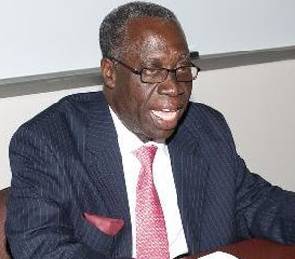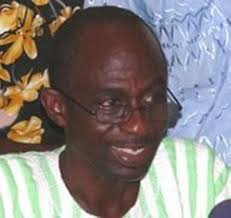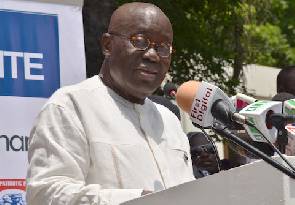 Former Finance Minister in the Kufuor administration, Yaw Osafo Maafo has argued that the ruling National Democratic Congress (NDC) government did not show discipline in the management of the economy.
Former Finance Minister in the Kufuor administration, Yaw Osafo Maafo has argued that the ruling National Democratic Congress (NDC) government did not show discipline in the management of the economy.
The situation, he noted, has forced the government to seek an IMF bailout.
Government over the weekend announced the decision to opt for an IMF bailout in order to save the ailing economy from sinking further.
The decision to turn back to the IMF and other development partners was one of the major resolutions reached after President John Mahama met the Presidential Advisory Committee on the Economy at Peduase last week.
But Mr. Maafo was quick to point out that the “IMF bailout will not come immediately.
The IMF is going to impose certain conditionalities or ask us to follow certain disciplinary actions. Money can’t come immediately so I am not expecting any money to come from IMF until 2015.”
Speaking to Joy News Monday, the former Finance Minister explained that in terms of management of an economy, the IMF gave disciplinary code to follow. “There is no doubt our economy has not been managed properly within the last two years,” he said.
He said the IMF has been through various methodologies since the 1970s. “We had the structural; we have various reform policies then they introduced the HIPC in 1996.”
He emphasized that even though the IMF bailout would help stabilize the cedi, it would take some time, maintaining that the cedi would continue to decline from now to the rest of the year.
He quizzed: “How do you go from a growth of 8.4 per cent in 2008 when you had no oil; jumped to 14 per cent in 2011 when you introduced oil and decline to about 6 today.”
“We must be ashamed of our management skills,” he stated. In terms of management of an economy, the IMF gives disciplinary code to follow. There is no doubt “our economy has not been managed properly within the last two years.”
Meanwhile, he indicated there was another advantage to the bailout. “Once people know – our creditors; our bankers and our business partners know that we have a programme with the IMF, there is an improved confidence in us and that would improve the country’s chances of getting a good rate for the Eurobond to be floated,” he explained.
Mr. Maafo continued that the currency depreciation had gone up about 30 per cent from the beginning of this year.
Data
The country’s net international reserve, Mr. Maafo mentioned went as high as about 4.4 billion and it declined to 900 million, only in its two weeks of reserve. “You can’t tell me that it is correct,” he said.
He foresaw the IMF adding more specific conditions to the bailout. “The IMF has a general theory; they have no objection to subsidy but you should be able to afford subsidy,” he noted.
“If your domestic and international debt has increased from 9 billion in 2008 to about 24 billion by the end of 2013, the question is, can you afford subsidies at all. The answer is No.”
Head of the International Monetary Fund, Christine Lagarde said the IMF did not do structural adjustment anymore. “You have to realize that we have changed the way in which we offer our financial support. It’s really on the basis of a partnership.”
In partnership, she admitted, there were always a bit of hardship to go with it because if the fund was called upon to help, “it is that the country feels that it cannot decide certain things on its own, it needs back up support financing to make sure it has access to enough funding to finance itself. So it’s a new phase,” she outlined.





